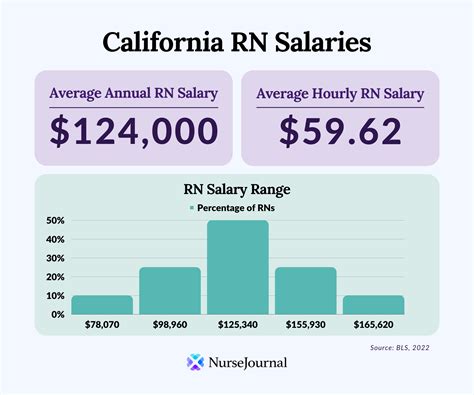Intro
Unlock the average hourly salary for registered nurses (RNs) across the US. Discover the latest pay rates, factors influencing RN hourly wages, and regional variations. Get insights into the highest-paying cities, industries, and specialties, plus expert tips for negotiating your salary. Stay ahead in the nursing job market with our comprehensive guide to RN hourly salary rates.
As the healthcare industry continues to evolve, nursing professionals remain in high demand. With the increasing need for skilled and compassionate caregivers, registered nurses (RNs) are not only in high demand but also command competitive salaries. In this article, we will delve into the world of RN hourly salary rates, exploring the average pay rates, factors influencing salaries, and what the future holds for nursing professionals.
The nursing profession is a rewarding and challenging career that requires dedication, hard work, and a strong passion for helping others. As the backbone of the healthcare system, RNs play a vital role in providing high-quality patient care, making informed decisions, and collaborating with other healthcare professionals to achieve optimal outcomes. With the increasing complexity of healthcare needs, RNs are not only in high demand but also command competitive salaries that reflect their skills, experience, and education.

Factors Influencing RN Hourly Salary Rates
RN hourly salary rates vary significantly depending on several factors, including location, experience, education, and specialty. Here are some of the key factors influencing RN hourly salary rates:
- Location: RNs working in urban areas tend to earn higher salaries than those working in rural areas. Cities with a high cost of living, such as New York or San Francisco, typically offer higher salaries to compensate for the increased cost of living.
- Experience: More experienced RNs tend to earn higher salaries, with those having 10-20 years of experience commanding the highest rates.
- Education: RNs with advanced degrees, such as a Bachelor of Science in Nursing (BSN) or a Master of Science in Nursing (MSN), tend to earn higher salaries than those with associate's degrees or diplomas.
- Specialty: RNs working in specialized fields, such as critical care, pediatrics, or oncology, tend to earn higher salaries than those working in general medical-surgical units.
Average RN Hourly Salary Rates by State
Here are the average RN hourly salary rates by state, based on data from the Bureau of Labor Statistics (BLS):
- Top 5 highest-paying states:
- California: $54.44 per hour
- Massachusetts: $53.45 per hour
- New Jersey: $52.64 per hour
- New York: $52.44 per hour
- Connecticut: $51.94 per hour
- Bottom 5 lowest-paying states:
- South Dakota: $34.44 per hour
- Alabama: $35.44 per hour
- Mississippi: $35.94 per hour
- Arkansas: $36.44 per hour
- West Virginia: $36.94 per hour
Specialty RN Hourly Salary Rates
RNs working in specialized fields tend to earn higher salaries than those working in general medical-surgical units. Here are some average RN hourly salary rates by specialty:
- Critical Care RNs: $55.44 per hour
- Pediatric RNs: $53.94 per hour
- Oncology RNs: $53.44 per hour
- Operating Room RNs: $52.94 per hour
- Emergency Department RNs: $52.44 per hour

How to Increase Your RN Hourly Salary
While RN hourly salary rates vary depending on several factors, there are several strategies to increase your earning potential:
- Pursue advanced education: Consider pursuing a BSN or MSN degree to increase your earning potential.
- Gain experience: More experienced RNs tend to earn higher salaries, so focus on gaining as much experience as possible.
- Develop specialized skills: Consider developing specialized skills, such as critical care or pediatrics, to increase your earning potential.
- Negotiate your salary: Don't be afraid to negotiate your salary, especially if you have specialized skills or experience.
What is the average RN hourly salary rate in the United States?
+The average RN hourly salary rate in the United States is $44.44 per hour, according to the Bureau of Labor Statistics (BLS).
What factors influence RN hourly salary rates?
+RN hourly salary rates are influenced by several factors, including location, experience, education, and specialty.
How can I increase my RN hourly salary?
+Consider pursuing advanced education, gaining experience, developing specialized skills, and negotiating your salary to increase your earning potential.
In conclusion, RN hourly salary rates vary significantly depending on several factors, including location, experience, education, and specialty. By understanding the factors influencing RN hourly salary rates and developing strategies to increase your earning potential, you can take control of your career and achieve financial success.
